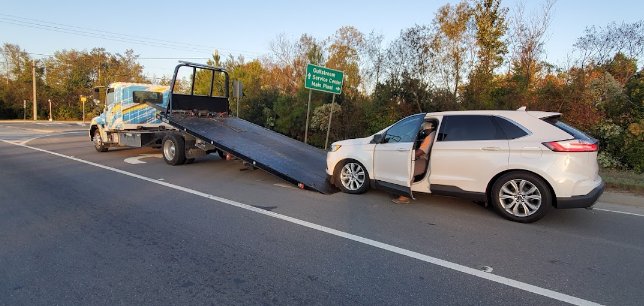Who Pays for Towing and Storage After an Accident in Georgia? A Guide for Savannah Drivers
Understanding Who Covers Towing and Storage Costs After an Accident in Georgia: A Guide for Savannah Drivers

After an accident, one of the most immediate concerns is what to do with your damaged vehicle. If your car needs to be towed from the scene, you might wonder who is responsible for paying the towing and storage fees. At Everready Recovery and Towing in Savannah, GA, we understand how confusing this process can be, especially when dealing with the stress of an accident. In this blog, we’ll help you understand who pays for towing and storage after an accident in Georgia, how insurance plays a role, and what steps you can take to ensure you’re prepared.
Who Is Responsible for Paying for Towing and Storage?
The responsibility for paying towing and storage fees after an accident in Georgia typically depends on who is at fault for the accident and the type of insurance coverage you and the other parties involved have. Here are some scenarios to help clarify how payment works:
1. When You Are Not at Fault
If you are not at fault for the accident, the at-fault driver’s insurance is generally responsible for covering the costs associated with towing and storage. Once the accident has been reported and a claim has been filed, the at-fault driver’s insurance company should arrange for payment of these fees.
However, it is important to note that insurance companies may take some time to process claims, and you may need to pay for the towing and storage fees upfront and seek reimbursement later. Be sure to keep all receipts and documentation related to towing and storage to make the reimbursement process smoother.
2. When You Are at Fault
If you are found to be at fault for the accident, the responsibility for paying for towing and storage typically falls on you or your insurance company. If you have collision coverage or towing and labor coverage as part of your auto insurance policy, these coverages can help pay for towing and storage costs.
Collision Coverage: This type of coverage helps pay for the cost of repairing or replacing your vehicle after an accident, and it may also cover towing costs.
Towing and Labor Coverage: Some insurance policies offer specific coverage for towing and roadside assistance, which can help cover the cost of towing your vehicle from the scene of an accident.
If you do not have sufficient coverage, you may be required to pay the towing and storage fees out of pocket.
3. When Fault Is Not Immediately Determined
In some cases, the determination of fault may take time, especially if there are multiple parties involved or if the accident is complicated. In such situations, you may need to pay for the towing and storage fees upfront while the insurance companies investigate and determine fault.
If it is later determined that another driver was at fault, you can seek reimbursement for the towing and storage costs from their insurance company. It’s crucial to keep all documentation and receipts related to these expenses to support your claim.
How Does Insurance Work for Towing and Storage Costs?
Insurance plays a significant role in determining who pays for towing and storage after an accident. Here’s how different types of insurance coverage can help:
Liability Coverage: Liability coverage is required in Georgia and helps pay for damages and injuries if you are at fault in an accident. If another driver is at fault, their liability coverage should cover your towing and storage costs.
Collision Coverage: If you are at fault, collision coverage can help pay for towing and storage fees as part of the cost of repairing or replacing your vehicle.
Roadside Assistance or Towing Coverage: Many insurance policies offer optional roadside assistance or towing coverage, which can help pay for towing and related expenses regardless of fault.
What About Storage Fees?
After your vehicle has been towed, it will likely be taken to a storage facility or tow yard until you decide where to have it repaired. Storage fees can add up quickly, so it’s important to act promptly:
Insurance Coverage for Storage: The at-fault driver’s insurance company should cover reasonable storage fees until the claim is processed and the vehicle is moved to a repair shop. However, if there are delays in deciding where to take the vehicle, you may be responsible for any additional storage fees.
Act Quickly: To minimize storage costs, it’s best to contact your insurance company as soon as possible after the accident to arrange for your vehicle to be moved to a repair shop or another location.
Steps to Take After an Accident in Georgia
To ensure that towing and storage costs are handled efficiently, here are some steps to take after an accident:
Contact Law Enforcement: Always report the accident to law enforcement and obtain an accident report. This report will be important for determining fault and handling insurance claims.
Contact Your Insurance Company: Notify your insurance company about the accident as soon as possible. They can help guide you through the process of arranging towing and filing a claim.
Document Everything: Keep detailed records of all expenses related to towing and storage, including receipts and invoices. This documentation will be crucial if you need to seek reimbursement from the at-fault driver’s insurance company.
Act Promptly: To avoid unnecessary storage fees, make arrangements for your vehicle to be moved to a repair facility or another location as soon as possible.
Why Choose Everready Recovery and Towing in Savannah, GA?
At Everready Recovery and Towing, we understand how stressful an accident can be, and we’re here to provide reliable and professional towing services to help you through this challenging time. We work closely with our customers and their insurance companies to ensure that the towing process is as smooth as possible. Here’s why you should choose us:
24/7 Availability: Accidents can happen at any time, which is why we offer 24/7 towing services throughout Savannah, GA, and the surrounding areas.
Experienced Team: Our team is highly trained and experienced in handling all types of towing situations, including accident recovery and heavy-duty towing.
Transparent Pricing: We provide clear and upfront pricing for our towing and storage services, so you know what to expect without any surprises.
Conclusion: Who Pays for Towing and Storage After an Accident?
The responsibility for paying for towing and storage after an accident in Georgia depends on who is at fault and the type of insurance coverage involved. If another driver is at fault, their insurance should cover these costs. If you are at fault, your insurance coverage, such as collision or towing coverage, may help pay for the expenses. In all cases, keeping detailed records and acting quickly can help minimize costs and ensure a smoother claims process.
If you need towing services in Savannah, GA, after an accident, contact Everready Recovery and Towing. Our professional team is here to assist you every step of the way.


